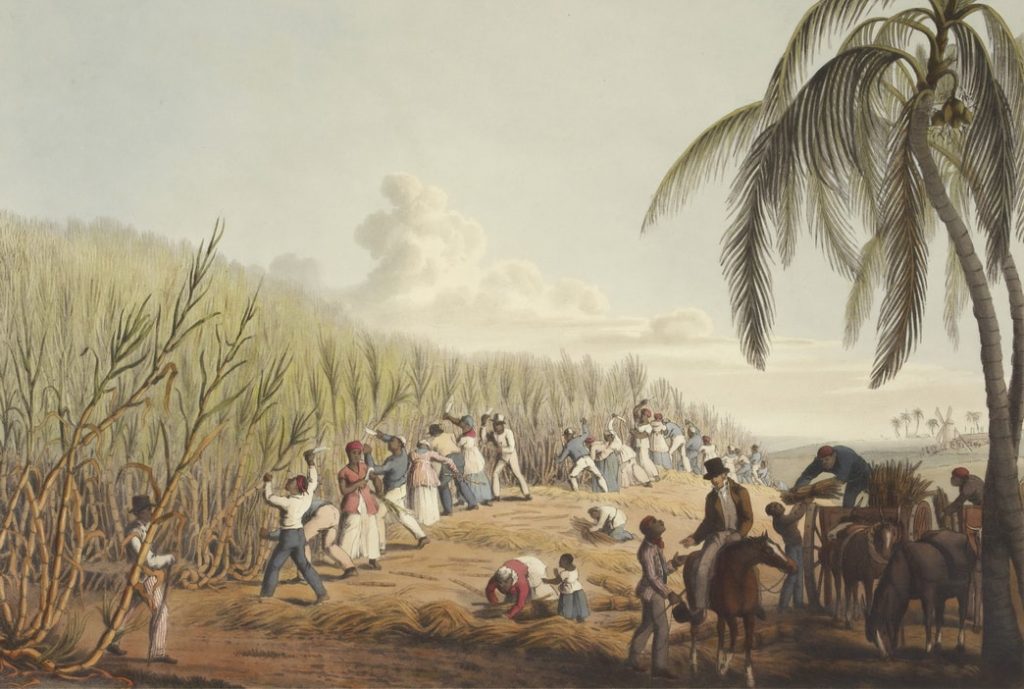Posts Tagged ‘Reparations’
Reparations Promotes Envy Not Responsibility
Evanston, Illinois became the first city in America to pass a “reparations” law to compensate for slavery. $25,000 checks will go out soon to black residents only–and many of them are unhappy and want more money.
Paying people today for yesterday’s sins is governmental and cultural insanity.
In Washington, D.C., a bill is making its way through the House of Representatives demanding that all non-black Americans pay reparations for the sins of slavery committed hundreds of years ago. That would divide America further and bankrupt the nation.
Reparations is a bad idea. It promotes envy (a sin) not responsibility (a virtue).
Reparations Promotes Envy Not Responsibility
I saw an article recently on the foolishness of reparations that made me feel like I was reading my own writing.
Here is what Star Parker had to say.
My Ancestors Were Slaves. Here’s What I Think About Reparations
“The House Judiciary Committee just held hearings on H.R. 40, which would establish a commission to look into ways in which African Americans could be compensated, including possible payments of trillions of dollars to individuals.”
“The commission would examine the role of government in supporting the institution of slavery, ‘discrimination in the public and private sectors against freed African slaves and their descendants,’ and ‘lingering negative effects of the institution of slavery … on living African Americans and on society.’”
“My ancestors were slaves. And my life as a young woman was a mess.”
“Was my life a mess because my ancestors were slaves? I don’t think so.”
“My life was a mess because I lived a wanton, irresponsible existence, defined by promiscuity, petty crimes, and scamming the nation’s well-meaning but totally confused welfare system to the greatest extent of my ability.”
“Did I need reparations to turn things around for me? Certainly not. I needed a wake-up call, which, to my great gratitude, I got from a few church-going black Christians who told me the way I was living was unacceptable.”
“I went to church, took back responsibility for my life, and turned my circumstances around.”
“The problem with the idea of reparations is it redirects attention away from exactly where attention is needed: on individuals’ personal responsibility for their own unique lives.”
“And it redirects attention in such a way to encourage individuals to believe that some abstract, collective entity from the past is the cause of all their individual problems in the present.”
“Compensation for damages is a basic legal principle.”
“It’s about personal responsibility. Individual A sues individual B for damages caused. Exactly what the damages were and exactly how B injured A must be shown in a court of law.”
“Today, only a small fraction of our population has ancestors who were around before 1865 when slavery was legal. The idea of collective guilt, with no specific individual identified as causing the damage and no specific individual showing how he or she was damaged, doesn’t fly.”
“If there is any legitimate claim of collective guilt, it is the guilt of original sin, which we learn in the book of Genesis. Every man and woman is imperfect and responsible for fixing themselves—and, by doing so, helping to fix the world.”
“There is no word more frequently used in political discussions than ‘freedom.’ But rarely discussed is what gives meaning to the word ‘freedom,’ and that is understanding that individuals have free choice—the power and responsibility to choose how to live.”
“Only when we understand that there is good and evil, that there is sin, does free choice have meaning. It means individuals have the power and responsibility to choose how to live—that their individual choices matter.”
“Driving the push for reparations are policies on race that obliterate this key idea that every individual, regardless of circumstance and history, is unique and has free choice. The political idea of freedom becomes irrelevant because free choice becomes irrelevant.”
“So-called critical race theory says everything is about culture. Because, per their claim, the USA is about what they define as white culture, the cultural script needs to be rewritten to make things fair for those who are not white. Put politicians in charge of making things fair.”
“No, I am sorry; I always thought the problem with racism is it denies the uniqueness, dignity, and personal responsibility of each individual.”
“If the ideal we seek is a free country with free citizens, then commissions such as that proposed in H.R. 40, which pretend to be about justice but are really about a left-wing agenda to put government in charge of our lives, are not the way to go.”
Exactly right.
I am not African American like Parker, but here’s what I shared a year ago.
Everybody’s Ancestors Were Slaves
Some people believe that every non-black in American needs to pay up for slavery (reparations).
Could any public policy be more absurd or expensive than that? (Unfortunately, that answer is yes but I digress.)
Have we so lost our common sense in the West that we forget that ALL our ancestors were once slaves to other nations?
- During the Roman Empire, half of its citizens were slaves–for nearly one thousand years. Should we send a bill to Italy?
- China and Mongolia made each other slaves for centuries–and finally built the Great Wall of China over the conflict (in which 2 million slaves died during its construction). Should Ulaanbaatar write Beijing a check?
- European nations took turns being the slaves for centuries. The Vikings made slaves of the Celts. The Visigoths enslaved the Slavs. Come to think of it, my German ancestors were slaves of the Goths for hundreds of years. Should I appeal to Angela Merkel for a reparations check?
- In the 20th century, the USSR enslaved numerous nations and the Imperial Japanese raped and oppressed the Chinese for a decade. Time to make that right with money?
As ugly as slavery is, during the seven thousand years of human history, more people have served as slaves of another culture than enjoyed the blessings of freedom. In some centuries they were the conquerors and in others the conquered.
Who should be paid? How far back should we go? What if you are half-slave? Or one-tenth?
You can’t pay for past sins.
God’s Word says it best:
“‘Doesn’t the child pay for the parent’s sins?’ No! For if the child does what is just and right and keeps my decrees, that child will surely live. The person who sins is the one who will die. The child will not be punished for the parent’s sins, and the parent will not be punished for the child’s sins.”
“Righteous people will be rewarded for their own righteous behavior, and wicked people will be punished for their own wickedness. But if wicked people turn away from all their sins and begin to obey my decrees and do what is just and right, they will surely live and not die” (Ezekiel 18:19-21).
That’s what Star Parker learned by experience. She chose responsible character which empowers a life instead of envy and greed which poison and destroy it.
In a book I ghost-wrote eighteen months ago about the life of Dr. Corinthia Boone, she recalls that her grandparents, who were children of freed slaves (just one generation removed), never demanded “a hand-out, just a hand up.”
Let’s follow their example–through the love of Jesus Christ.
Everyone’s ancestors were slaves. Let’s leave the past behind–and offer a helping hand to everybody who needs one–by rejecting envy and promoting responsibility in every precious human life.
Everyone’s Ancestors Were Slaves
As Bernie Sanders becomes the front-runner in the presidential race and the Democratic Party appears to be morphing into the “Socialist Workers Guild,” it might be helpful to examine one of the extreme ideas that has emerged from those precincts.
It’s the notion that today’s American citizens should pay reparations (money) to all those descended from slaves.
I have news for the unthinking: Everyone’s ancestors were once slaves.
So, where do you begin–to be “fair?”
Everybody’s Ancestors Were Slaves
Yesterday Bill O’Reilly shared on his podcast (I recommend you sign up for it at billoreilly.com) that for the first time in his life he needs to vocally resist the ideas of the current Democratic Party because they would be disastrous for America.
Those ideas include open borders, the Green New Deal, socialism, killing babies after birth, climate change hysteria, Medicare for All, forcing LBGTQ norms on society, and a host of other radical measures.
Reparations for slavery is one of their absurdly hurtful proposals.
Megan Henney of Fox Business describes the issue (June 20, 2019):
“As the 2020 race begins to heat up, some of the biggest talking points and policy debates are beginning to come into focus. That includes the discussion of reparations for the descendants of slaves in the U.S., a policy that’s been addressed by several Democratic presidential hopefuls – a marked turn from previous election cycles. Both Hillary Clinton the 2016 Democratic nominee and former President Barack Obama opposed reparations.”
“Although critics argue that reparations are impractical to calculate how to fairly distribute, a new paper published in the Social Science Quarterly estimated it could cost between $5.9 trillion and $14.2 trillion ($150,000-$300,000 to every African-American). The author of the paper calculated that number based on the number of hours all slaves worked in the U.S. from when the country was officially established in 1776.”
Henney quotes some former and current Democratic candidates on reparations:
Cory Booker: “Our country is not truly free from the historically rooted and hideous legacy of slavery. I believe right now, today, we have a historic opportunity to break the silence, to speak to the ugly past and talk constructively about how we will move this nation forward.”
Booker has introduced a bill in the Senate that calls for a “study of reparations.”
Elizabeth Warren is one of the 12 co-sponsors of the Senate bill. She says, “We must confront the dark history of slavery and government-sanctioned discrimination in this country that has had many consequences including undermining the ability of black families to build wealth in America for generations,”
Another co-sponsor is Kamala Harris:
“When you are talking about the years and years and years of trauma that were experienced because of slavery, because of Jim Crow and because of all that we have seen in terms of institutional and legal discrimination and racism, this is very real and it needs to be studied. We need to look at exactly how the response should be played out.”
Julian Castro, former Housing and Urban Development Secretary and San Antonio mayor was one of the first presidential candidates to say he would consider reparations for black people in the U.S.
“I’ve long believed the country should consider reparations because of the atrocity of slavery. I also believe that we’re never going to fully heal as a country from the racial divide until we’ve addressed the tremendous wrong that was done with slavery.”
Bernie Sanders also co-sponsored Booker’s bill but has some concerns.
“I think what we have got to do is pay attention to distressed communities: black communities, Latino communities, and white communities, and as president, I pledge to do that…and I think there are better ways to do that than just writing out a check.”
Only former vice president Joe Biden has not endorsed reparations in the Booker “study” bill.
I wouldn’t be surprised to see the following recommendation in the 2020 Democratic presidential platform this summer:
Every non-black in American needs to pay up for slavery.
Could any public policy be more absurd or expensive than that? (Unfortunately, that answer is yes but I digress.)
Have we so lost our common sense in the West that we forget that ALL our ancestors were once slaves to other nations?
- During the Roman Empire, half of its citizens were slaves–for nearly one thousand years. Should we send a bill to Italy?
- China and Mongolia made each other slaves for centuries–and finally built the Great Wall of China over the conflict (in which 2 million slaves died during its construction). Should Ulaanbaatar write Beijing a check?
- European nations took turns being the slaves for centuries. The Vikings made slaves of the Celts. The Visigoths enslaved the Slavs. Come to think of it, my German ancestors were slaves of the Goths for hundreds of years. Should I appeal to Angela Merkel for a reparations check?
- In the 20th century, the USSR enslaved numerous nations and the Imperial Japanese raped and oppressed the Chinese for a decade. Time to make that right with money?
As ugly as slavery is, during the seven thousand years of human history, more people have served as slaves of another culture than enjoyed the blessings of freedom. In some centuries they were the conquerors and in others the conquered.
Who should be paid? How far back should we go? What if you are half-slave? Or one-tenth?
We have been told by the New York Times via the “1619 Project” that America was founded on slavery. That was 400 years or ten generations ago.
Thank God a wiser group has countered their propaganda. The Woodson Center announced recently sponsorship of “1776,” a collection of essays and other material mostly written by black scholars and community and business leaders.
Their goal is to tell “the complete history of America and black Americans from 1776 to present.”
But not ask for money.
Coleman Hughes, an undergraduate student at Columbia University, is one of the contributors to “1776.” He says, ““Today, we are challenging that [1619] false narrative. Any argument that says the institution of slavery is what makes America unique must grapple with the fact that slavery was practiced in almost every society on earth until just a few centuries ago, as well as the fact that most of those societies have done far less to acknowledge and atone for it.”
“To point to America’s worst sins,” Hughes said, “is to point out what is least unique about us.”
And you can’t pay for past sins.
God’s Word says it best:
“‘Doesn’t the child pay for the parent’s sins?’ No! For if the child does what is just and right and keeps my decrees, that child will surely live. The person who sins is the one who will die. The child will not be punished for the parent’s sins, and the parent will not be punished for the child’s sins.”
“Righteous people will be rewarded for their own righteous behavior, and wicked people will be punished for their own wickedness. But if wicked people turn away from all their sins and begin to obey my decrees and do what is just and right, they will surely live and not die” (Ezekiel 18:19-21).
In a book I co-authored this past summer about the life of Dr. Corinthia Boone, she recalls that her grandparents, who were children of freed slaves (just one generation removed), never demanded “a hand-out, just a hand up.”
Let’s follow their example–through the love of Jesus Christ.
Everyone’s ancestors were slaves.
Let’s leave the past behind–and offer a helping hand to everybody who needs one.
The Last History Book – and Other Summer Reading
This week the U.S. House Judiciary Committee re-visited the issue of reparations for slavery. Most of the discussion–minus one brilliant presentation by the youngest African-American to testify–showed an abysmal ignorance of history and what we should learn from it.
As the lazy, hazy days of summer come upon us, I recommend to you my ten favorite history books.
You especially must not miss The Last History Book–and other summer reading.



